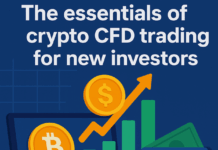Social media has taken such a turn that now it can be considered one of the most toxic online environments. It’s the place where influencers are selling you uncertified products and low-qualitative clothes with considerable prices, and also where people are taken advantage of the most. Unfortunately, this trend has tended to increase dramatically in the past years.
To showcase this growing phenomenon, let’s assume the case of US consumers; more than 95,000 of them were scammed, resulting in $770 million in financial losses caused by online shopping or cryptocurrency investing.
But there are a few methods of protecting yourself when browsing the internet so that other fake companies and scammers never fool you. You only need to be a little bit more careful about what sites you visit and enforce strong safety and security protection.

Know how to differentiate scams
The biggest problem when it comes to surfing the internet is that people don’t know what’s the difference between scams and genuine contests. Most of the time, these people fall under an older age category, and this is exactly what scammers target in their fake ads and posts.
Most of the time, these announcements include giving free gift cards, money, or even cryptocurrencies, and only for the price of commenting on a post, sharing, or in the worst case, contributing with a small amount of money to enter the contest.
So, what you should be wary of is fake profiles on Facebook, Instagram, and such platforms. It’s best to check the page and see when it was created because most of these scams are newly introduced into a platform with new accounts that have no familiar friends or things in general with you. If these accounts message you, it would be best to report and block them, so there’s no chance of getting scammed.
Avoid clickbait
Clickbait has been one of the worst things in a pandemic, especially since scammers have been spreading fake information regarding health concerns. However, click-baiting is such a common practice that it’s easy to get fooled and actually believe what anyone writes on social media platforms.
Clickbait is the method in which scammers and untrusted pages devise scandalous titles and articles that make you click on the link, share the article, and do such actions that sometimes can cause you to lose data. That’s because some of these sites are full of malware and ransomware, which can linger around in your computer or phone device if you’re not careful. Upon entering these websites, you might be required to enter sensitive data about yourself, such as your name, credit card, and such, which can result in severe data theft. In these cases, according to https://www.how-to-sue.co.uk/, you might be eligible for a data breach claim that can compensate you for the amount of financial; losses you’ve experienced.
Stop oversharing information
Some of these scammers are real people, not only bots, and they can use the information you’re giving freely on the internet against you. Although it’s best not to overthink this, sometimes you should keep things to yourself and avoid oversharing things, such as what sites you usually visit or places you visit weekly. Even if it doesn’t sound like much, you can use all this information for guessing your passwords or devising special clickbait posts and articles.
If you feel the need to share things with your friends, Facebook and Instagram allow you to hide posts and shares from people you don’t know so that you can make your profiles private. This way, no stranger can message you or analyse your profile. You can even create two accounts, one for your close friends and another one for family or school matters.
Protect your accounts
One of the reasons why people get scammed and lose money is that they don’t properly secure their accounts. Either they use weak passwords (like common names or nouns) or enter weird websites that are clearly not safe. So, to protect your social media accounts, you can do the following:
- Check your privacy setting and ensure you’re not giving too many permissions when it comes to sharing data with third parties;
- Pick a strong password that includes numbers, letters, and some symbols, and make it as complicated as possible. It’s also essential to change your password from time to time and use different combinations for every account;
- Try not to use public networks and rely only on your phone data or home internet connection;
- Check the links you’re clicking twice to ensure you’re not entering a dangerous website;
- Secure your accounts by activating two-factor authentication where possible;
Be wary of strangers
Sometimes people can take advantage of you by getting close to you and acting as a friend or even a lover. This is one of the most common types of scams because even if it takes some time, In the end, the guilty persons get what they want, and you’re left with no financial resources. Therefore, you need to be careful with who you’re talking to and to engage because most of these people are faking their personalities and mirroring yours just so that you can trust them.
For example, if that person has no photo on their profile (or uses an obviously fake one), you immediately need to stop talking to them because when asking for a photo, they’ll always find an excuse not to show themselves. At the same time, they won’t offer too much information on what they do or like. Most likely, these people will love to bomb you so that you think they care, but in fact, these scammers will eventually ask you for money or other things in exchange.
Bottom line
Being on the internet sometimes makes you vulnerable, especially if you’re young and don’t know how to read people. However, regardless of your age, it’s essential to be more careful with who you’re talking to, what information you are sharing, and what websites you’re accessing on a daily basis because these factors contribute to getting scammed more or less.


















